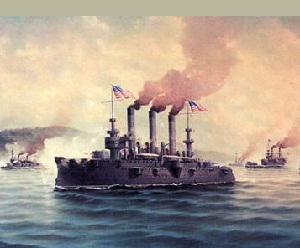 On the eve of another Independence Day celebration in the United States, July 3 1898, underway in Santiago de Cuba was a naval battle, in which Cubans summoned all their courage and sacrifice, to finally win their independence, after so many years of struggle. Visible on the horizon was the achievement they had dreamed of for so long, for which so many lives had been lost: Cuba’s independence from Spanish colonialism.
On the eve of another Independence Day celebration in the United States, July 3 1898, underway in Santiago de Cuba was a naval battle, in which Cubans summoned all their courage and sacrifice, to finally win their independence, after so many years of struggle. Visible on the horizon was the achievement they had dreamed of for so long, for which so many lives had been lost: Cuba’s independence from Spanish colonialism.
Since the month of April, alleging humanitarian purposes, U.S. ships had mounted a naval blockade of Cuban ports, and unbeknownst to Cubans, they had signed a Joint Declaration with Spain, in which Cuba’s right to be free and independent was recognized, and the United States renounced any intention of exercising sovereignty over the island, except to ensure its “pacification.”
Nevertheless, with the arrival of July, the Spanish proceeded to sink an old ship, the Reina Mercedes, to obstruct the mouth of Santiago Bay and prevent the entrance of U.S. ships; while the Spanish captain general of the island, Ramón Blanco, refused to surrender; and news of the destruction by the U.S. Navy of Rear Admiral Pascual Cervera’s fleet as they attempted to leave the bay was received with jubilation in the United States.
At this point, the United States took important steps: blockading Cuban ports, mobilizing navy ships and boats, and training an army of volunteers in a Florida camp. Their success in the Philippines, their initial contacts with Cuban General Calixto García, and a representative of the Cuban Revolutionary Party, Tomás Estrada Palma, on their side, allowed the United States to present itself as a “pacification” force.
But a different reality was imposed: the naval blockade impacted, much more than the Spanish forces, the population, which beyond the exhaustion produced by the war, was now crowded into the city, while U.S. troops used Cubans to do the brunt of the fighting, only to later replace them.
On the coasts of Guantánamo and Santiago de Cuba alone, more than 16,000 men landed, which along with the bombing of the city, the refusal to recognize the Liberation Army, and the military landing a few days later, completed the cycle that led to the first imperialist war in history, as Lenin described it.
One hundred and twenty years later, it is ironic to consider that a country like the United States, which shed so much blood to win its own independence and unification, that would launch a conflict of such magnitude in the name of peace, but with the actual intention of taking control of the coveted island, the gateway to the Gulf of Mexico, and at the same time extend its reach into Our America.
The United States forged ahead raising its flag, following the infamous Monroe Doctrine which appears to be regaining strength, ignoring the fact that times have changed, and that Fourth of July celebrations should today, more than ever, serve as an opportunity for reflection on sovereignty and peaceful accord among peoples.
(Granma)